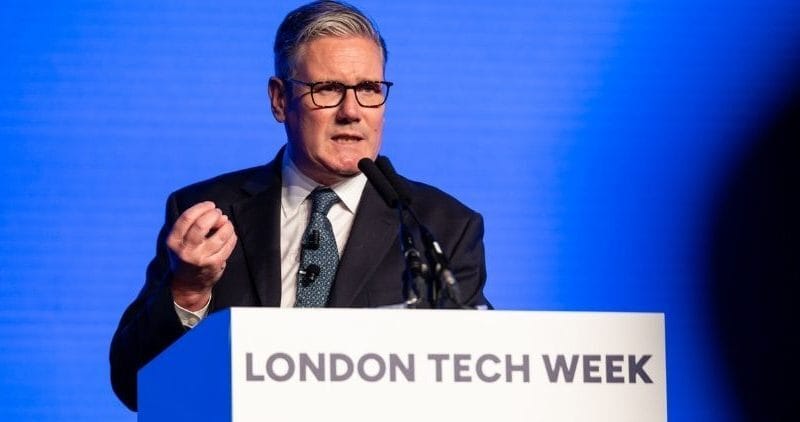- FutureIntelX
- Posts
- Britain’s £80K AI Gamble: Underfunding Sovereignty in a Superpower Race.
Britain’s £80K AI Gamble: Underfunding Sovereignty in a Superpower Race.
Plus ➜ Cloudflare Locks the Gates: AI Data Crawlers Now Face a Toll Booth.➜ Meta’s Superintelligence Unit Signals a New Phase in the AGI Arms Race.
POLICY & GOVERNANCE
Britain’s £80K AI Gamble: Underfunding Sovereignty in a Superpower Race.

Image source: Tech funding news
As the AI arms race accelerates globally, the UK just posted a job to lead its AI sovereignty strategy offering £80,000.
That’s right. While the U.S., China, and the EU pour billions into digital sovereignty, Britain is offering mid-level salary bands to the person tasked with shaping its national AI edge.
The role housed within the Department for Science, Innovation and Technology aims to define how the UK retains control over foundational AI systems, compute infrastructure, and standards.
Yet the low pay and vague scope triggered backlash. AI leaders called it “out of touch” and “politically unserious.” The timing is sensitive: just weeks after Keir Starmer’s Labour government pledged to take AI sovereignty seriously. And days before further negotiations with the U.S. and EU on joint compute alliances.
What It Signals
This isn’t about salary. It’s about strategic signaling.
In an era where AI capabilities define economic and military advantage, the UK’s move sends a weak message: that AI sovereignty is a bureaucratic afterthought, not a national imperative.
Contrast that with the U.S. $200M Pentagon OpenAI pilot, France’s €1.5B sovereign AI fund, and China’s direct state backing of compute giants like Inspur. In this context, Britain’s offer looks less like leadership and more like abdication.
More troubling? The UK’s best AI minds may read this not as a call to serve but a call to exit.
Action Radar
Watch how talent responds. Expect further brain drain to the U.S., UAE, or private AGI labs unless incentives match the strategic weight of the mission.
If the UK wants to shape global AI norms not just follow them it must treat AI leadership like it treats nuclear strategy: with budget, urgency, and backbone.
What would it take for your nation to own not rent its AI future?
POLICY & GOVERNANCE
Cloudflare Locks the Gates: AI Data Crawlers Now Face a Toll Booth

Image source: Tech business news.
On July 1, Cloudflare guardian of over 20% of the internet announced it will begin blocking AI crawlers by default. This is no small filter tweak. It’s a global rebalancing of AI’s invisible supply chain: public web data.
Until now, most AI firms from OpenAI to Anthropic have operated under a tacit “crawl and train” culture. But Cloudflare has drawn a line. If you want to extract value from web content, you’ll now need permission and payment. Their new “Pay-Per-Crawl” model is already backed by major publishers like The Atlantic and Dotdash Meredith, signaling a coalition forming around data sovereignty.
What triggered this? Quiet frustration. Publishers have long watched LLMs scrape their archives, repurpose their value, and return nothing. Cloudflare just gave them a lever.
What It Signals
This move is not about bandwidth. It’s about power specifically, who controls the raw material of AI.
The AI gold rush has largely relied on unregulated, open access to content. Cloudflare’s pivot formalizes a shift from open harvesting to walled ecosystems. In short: data is no longer free.
We are witnessing the early structure of an AI training cartel were only firms with direct data partnerships, proprietary archives, or licensing deals can build frontier models at scale. This compresses the field and elevates those who own or broker access.
Meanwhile, tension between publishers and AI giants already brewing in lawsuits now escalates into infrastructure policy.
Action Radar
Executives must re-evaluate their AI build strategy. Who owns your training data? Are you at risk of being locked out or locked in?
Policymakers should expect calls for global standards on web data rights. This won’t be settled by tech alone it’s now a legislative frontier.
Monitor: Which CDN, ISP, or major host follows Cloudflare’s lead? If even two more players join, the AI web could fragment overnight.
Are you building your AI advantage on leased land or on sovereign data you control?
STRATEGIC FORCAST
Meta’s Superintelligence Unit Signals a New Phase in the AGI Arms Race

Image source:
Meta has launched a dedicated “Superintelligence” division, marking its clearest declaration yet: the company intends to compete directly in the artificial general intelligence (AGI) race.
This new unit will consolidate Meta’s leading researchers under a singular mandate, build AI that goes beyond task completion and approaches human-level cognition.
Unlike prior models optimized for engagement or content generation, this effort targets what CEO Mark Zuckerberg calls “open-source superintelligence.” Meta is also doubling down on infrastructure, investing heavily in compute, open weights, and alignment safety.
The timing is no accident. OpenAI, DeepMind, XAI, and Anthropic have all made decisive AGI moves. Meta, until now, played catch-up. This new structure rewires its internal architecture to prioritize cognition over content, strategy over scale.
What It Signals
This is less a technical pivot and more a strategic repositioning.
Meta is officially stepping out of the consumer product shadow and into the sovereign intelligence arena. The move signals a recalibration from product monetization to civilizational relevance. AGI is no longer a lab ambition; it’s a geopolitical asset.
By championing open-source AGI, Meta is also challenging the closed-weight dominance of OpenAI and Google DeepMind. But with superintelligence on the table, the stakes move beyond market share, they touch on alignment risks, national security, and cognitive sovereignty.
Global regulators, meanwhile, remain caught in reactive mode while the infrastructure to birth AGI centralizes in fewer, more powerful hands.
Action Radar
Expect Meta to court government partnerships next especially across Europe and the Global South to frame its open-source model as a public good.
CEOs and policymakers must begin scenario-planning for AGI that is not controlled by nation-states but by tech giants with global footprints and ideological influence.
Watch for rising calls to classify AGI infrastructure as a “strategic technology domain,” akin to nuclear, bio, and cyber.
In the race for AGI, will influence belong to the one who builds it or the one who aligns it?
How can we make FutureIntelX more valuable for you? |
Reply